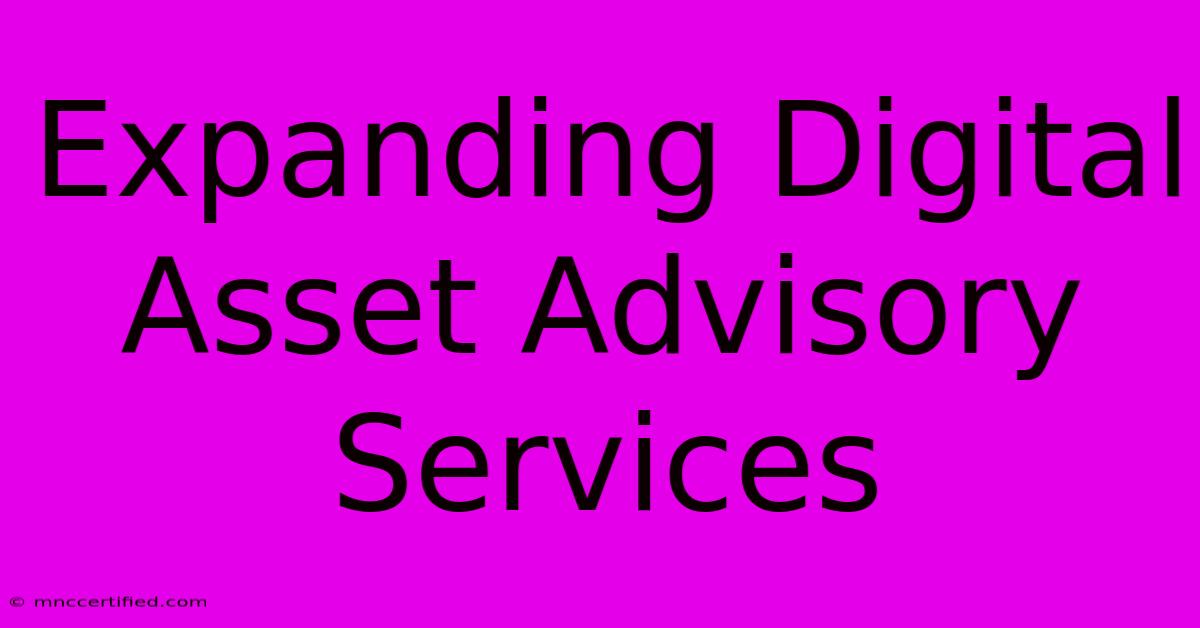Expanding Digital Asset Advisory Services

Table of Contents
Expanding Digital Asset Advisory Services: A Guide for Financial Professionals
The world of finance is rapidly evolving, with digital assets playing an increasingly significant role in investment portfolios. For financial professionals, this presents both challenges and immense opportunities. This article explores how to successfully expand your services to include digital asset advisory, focusing on key strategies for growth and client acquisition.
Understanding the Growing Demand for Digital Asset Advisory
The surge in popularity of cryptocurrencies like Bitcoin and Ethereum, alongside the rise of NFTs and DeFi protocols, has created a massive demand for expert guidance in this complex space. Many high-net-worth individuals (HNWIs) and sophisticated investors are looking to diversify their portfolios with digital assets, but lack the knowledge and expertise to navigate the inherent risks and opportunities. This creates a lucrative niche for financial advisors willing to adapt and expand their skill sets.
Identifying Your Target Audience
Before expanding your services, clearly define your target audience. Are you focusing on:
- High-net-worth individuals (HNWIs): These clients often have larger investment portfolios and a higher risk tolerance.
- Institutional investors: This requires specialized knowledge and compliance procedures.
- Retail investors: This segment requires a different approach, focusing on education and risk mitigation.
Understanding your target audience will inform your marketing strategies and the types of services you offer.
Key Steps to Expanding Your Digital Asset Advisory Services
Successfully integrating digital asset advisory requires a strategic approach:
1. Gaining the Necessary Knowledge and Expertise
This is paramount. You need a strong understanding of:
- Blockchain technology: Fundamental knowledge of how blockchain works is crucial.
- Cryptocurrency trading and investing: Learn about various cryptocurrencies, their underlying technologies, and market dynamics.
- Regulatory landscape: Stay updated on evolving regulations surrounding digital assets.
- Security best practices: Protecting client assets is critical, requiring robust security protocols.
- Tax implications: Understand the complex tax implications of digital asset transactions.
Consider pursuing relevant certifications or professional development courses to enhance your credibility.
2. Developing a Robust Compliance Framework
Compliance is crucial, especially given the regulatory uncertainty surrounding digital assets. Ensure you:
- Understand relevant regulations: Stay informed about KYC/AML compliance and other relevant laws.
- Implement robust security measures: Protect client data and assets from cyber threats.
- Maintain thorough record-keeping: Accurate record-keeping is essential for audit trails and compliance.
- Seek legal counsel: Consult with legal professionals specializing in digital assets to ensure compliance.
3. Building a Strong Technology Infrastructure
Investing in the right technology is essential:
- Secure digital wallets: Choose reputable and secure custodial or non-custodial solutions.
- Portfolio management software: Utilize software that can track digital asset holdings and performance.
- Data analytics tools: Leverage data analytics to monitor market trends and inform investment strategies.
4. Marketing and Client Acquisition
Marketing your new services requires a targeted approach:
- Networking: Attend industry events and conferences focused on digital assets.
- Content marketing: Create valuable content (blog posts, white papers, webinars) demonstrating your expertise. Keywords like "digital asset management," "cryptocurrency advisory," and "blockchain investment strategies" are crucial here.
- Social media marketing: Engage with potential clients on platforms like LinkedIn and Twitter.
- Search Engine Optimization (SEO): Optimize your website and content for relevant keywords to attract organic traffic.
5. Providing Exceptional Client Service
Building trust is crucial in the digital asset space. Provide:
- Personalized investment strategies: Tailor your advice to each client's individual financial goals and risk tolerance.
- Transparent communication: Keep clients informed about market developments and their portfolio performance.
- Responsive support: Provide readily available support to address client inquiries and concerns.
Mitigating Risks in Digital Asset Advisory
The volatility of the digital asset market necessitates a strong risk management strategy:
- Diversification: Encourage clients to diversify their holdings across multiple assets.
- Risk assessment: Thoroughly assess client risk tolerance before recommending any investments.
- Due diligence: Conduct thorough due diligence on all digital assets before recommending them.
- Transparency: Be transparent about the risks associated with digital asset investments.
By focusing on these key areas, financial professionals can successfully expand their services into the lucrative and rapidly growing field of digital asset advisory. Remember, continuous learning and adaptation are essential to thrive in this dynamic space.

Thank you for visiting our website wich cover about Expanding Digital Asset Advisory Services. We hope the information provided has been useful to you. Feel free to contact us if you have any questions or need further assistance. See you next time and dont miss to bookmark.
Featured Posts
-
South Korea Alters Border Signage Drops North Cities
Dec 28, 2024
-
Fabianski Speaks After Incident
Dec 28, 2024
-
Keir Starmers Brother Nick Key Facts
Dec 28, 2024
-
West Hams Fabianski Talking
Dec 28, 2024
-
Live Updates Syracuse Vs Washington State
Dec 28, 2024